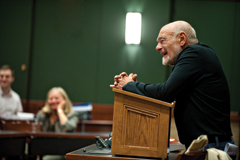The ZEAL program's dual approach to entrepreneurial education— the clinic, together with several new courses tailored for the entrepreneurial lawyer, for businesses large and small—is at the heart of the school's philosophy of joining the practical with the purely academic, said Law School Dean Evan Caminker.
"We are preparing our law students with a specialized skill set that will enable them to serve the small business community through entrepreneurial start-ups," Caminker said. "At the same time, we can encourage up-and-coming entrepreneurs by helping them get started and grow."

Significantly, the approach also benefits the largest number of students from across all disciplines and schools on the Ann Arbor campus.
"While our law students have huge interest in business law courses, there's an even larger, unmet need for legal advice among campus entrepreneurs," Caminker said.
The clinical aspect of ZEAL will deploy student-attorneys, supervised by faculty members, to help founders of promising student ventures iron out the business formation, trademark, finance, patent, regulatory, and other issues that can complicate the establishment of any entrepreneurial business.
The program will support such existing initiatives as the ZLI, which was cofounded by Zell in 1999 and has granted more than $2.3 million in support of start-ups for graduate students and undergraduates alike. Tim Faley, ZLI's managing director, said the rest of the University community will be grateful for Law School help.
"We know the Law School is going to be a great partner," Faley said. "All of Michigan's entrepreneurial programs are looking for legal counsel. And law students are saying much the same thing—that they'd love to learn how these deals go down."
The clinical aspect of ZEAL will deploy student-attorneys, supervised by faculty members, to help founders of promising student ventures iron out the business formation, trademark, finance, patent, regulatory, and other issues that can complicate the establishment of any entrepreneurial business.
"This kind of relationship with the Law School will be really valuable for both groups, in terms of giving the law students insight into the entrepreneurial process and giving other students insight into the legal issues surrounding formation of a new business," said Mike Johnson, a 2011 MD/MBA graduate now working as a research fellow at U-M's Medical Innovation Center.
"It's a good time at the University to have these groups come together in a more formal way," added Johnson, who was managing director of the Wolverine Venture Fund last year. "There will be lots of work, and it will be a fruitful experience for everyone."
That view was echoed by Michigan Law adjunct professor Barrie Loeks, '79, who is helping organize ZEAL. She said program designers came up with about a dozen new courses tailored to entrepreneurial-minded student lawyers.
"Working with entrepreneurial businesses requires a different skill set and a different approach than working with larger, established businesses," Loeks said. "With most of the nation's job growth coming from entrepreneurial businesses, we need to better prepare our law students to provide strategic legal guidance to those businesses."
The program will do that, while also supporting such existing initiatives as the ZLI. "We're coming up with the next generation of solutions right here, right now, on this campus, in every important field," said Loeks, who earned both undergraduate and law degrees at U-M. "Put together our business students, our med students, our engineering students, and our law students, and watch out. They'll change the world. But we need to put them together. We need to help them."
Loeks, whose background is both entrepreneurial and corporate, founded with husband Jim Loeks the Michigan-based Star Theatres. Later she became co-CEO of Sony's 250-location Loews Theatres—a position that made her the highest-ranking woman in the Sony corporate empire.
Long active in an advisory capacity with her alma mater, Loeks hopes ZEAL, in which she'll continue to have an active role, will pull together various strands of entrepreneurship across campus in order to create a critical mass of creative business thought. Along the way, she hopes entrepreneurs' somewhat jaded ideas about lawyers will change.
"Entrepreneurs usually look at lawyers as a necessary evil—they're expensive, and they're considered obstacles," Loeks said. "But any successful entrepreneur knows that a collaboration with a good lawyer who understands the business can make you enormously more successful."
More information about University entrepreneurial efforts is available at the Innovate site.